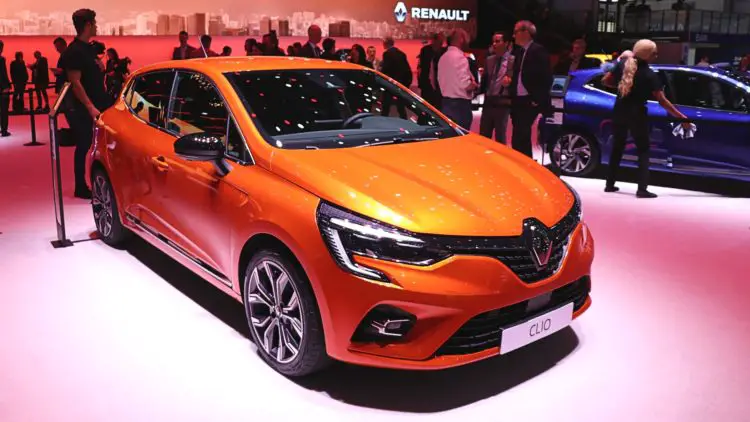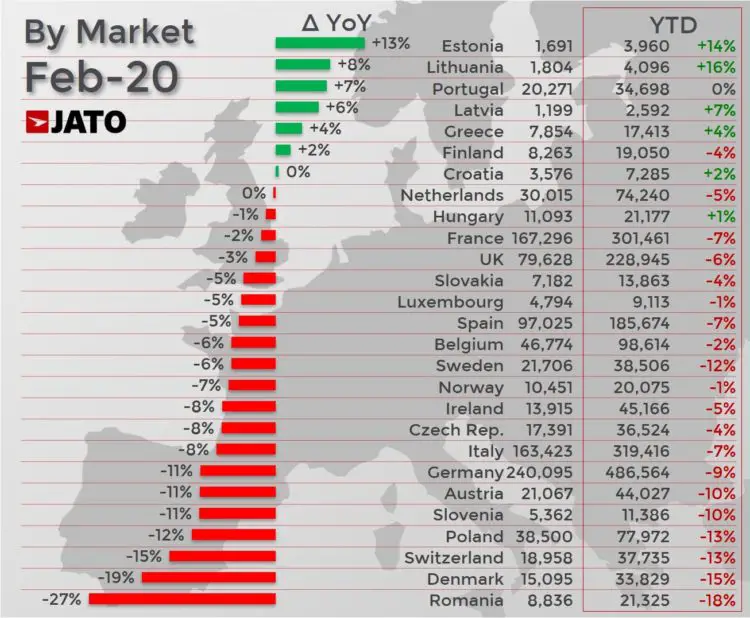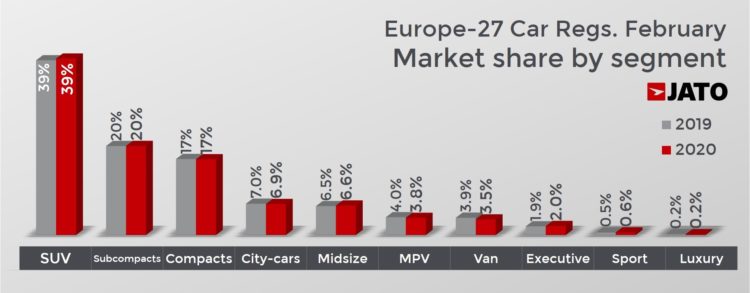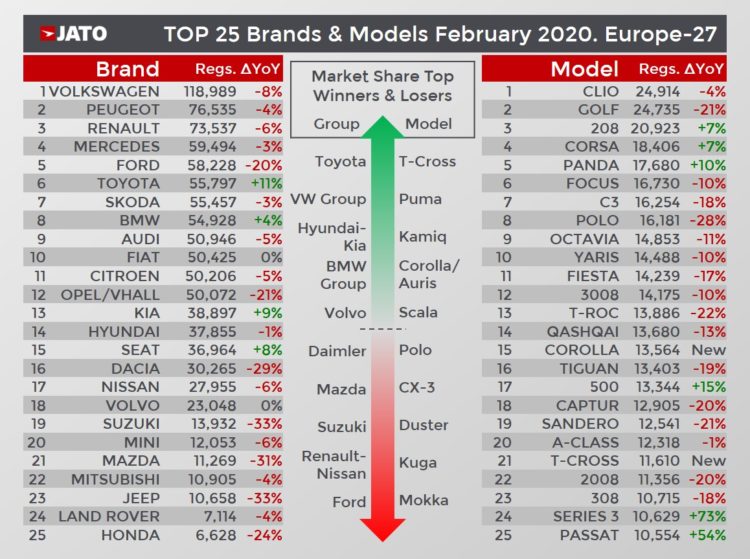In February 2020, new passenger vehicle registrations in Europe contracted by 7%. The Renault Clio outsold the Volkswagen Golf.

New car sales in Europe (European Union, EFTA, and the UK) were 7% lower in February 2020 than a year ago and follows on January when the market contracted by an even stronger 7.6%. Car sales were down in all but seven small European country markets. Sales of electrified vehicles in Europe almost doubled from a year ago. SUVs continued to gain market share. The European market was not yet affected by the Coronavirus. The Renault Clio narrowly outsold the Volkswagen Golf to become Europe’s favorite car model in February 2020.
European Car Market Statistics 2020: January, February, March, April, May, June, July, August, September, October, November, December
European New Car Market in February 2020

The decline of the European new car market has continued throughout February 2020. According to JATO Dynamics data, 1,063,264 units were registered in February 2020, compared to 1,143,852 in February 2019. This equates to a decline of 7.0% – the lowest number of registrations since 2015, when only 955,113 cars were registered.
Weak new car sales in Europe in February 2020 followed on the negative results seen in January 2020 when volume fell by 7.6%. Thus, the first two months of this year, have already seen a cumulative fall in registrations of cars in Europe of 7.3% to 2,194,706 units.
Felipe Munoz, global analyst at JATO Dynamics, commented: “The situation is rapidly deteriorating in Europe due to complex regulation, lack of available homologated cars, and increasing pressure on the economy. All of these factors are having a detrimental impact on consumer confidence.” As of February 29th, 2020, our data has shown that the impact of Covid-19 has yet to hit the European automotive market. As although registrations only increased in 6 markets, this made up just 4% of total volume for the month.
Car Sales Per European Country in February 2020

New passenger vehicle registrations in Europe (EU, EFTA, UK) in February 2020 and year-to-date 2020 were lower in almost all but a few smaller markets. The Baltic countries were the fastest growing new car markets in Europe but the actual volume is very small.
Of the largest European car markets, the British new car market was performing the strongest but sales were down 6% year-to-date 2020. The UK market was only the fourth largest in Europe thus far in 2020 but it is traditionally small during the first two months of the year with March usually by far the most important month for the British car industry.
Car sales in Italy, France, and Spain were down 7% thus far this year with the Italian market, as if often the case at the start of a calendar year, slightly bigger than the French market. Germany remained by far the largest car market in Europe despite sales contracting by 9% thus far in 2020.
Increased Electrified Car Sales in Europe in 2020 (February)

Electrified vehicles (EV) were once again the outlier in the industry. Their registrations jumped from 75,400 units in February 2019 to 135,500 units last month. It is important to note that the majority of electrified vehicle sales were not for battery-electric vehicles (BEV) with doubts remaining how much, if anything, many plug-in hybrids contribute to lower actual emissions.
The increase of over 80% came at the expense of diesel and petrol cars that saw significantly fewer registrations. Munoz added: “So far this year, electrified vehicles have been the only lifeline for manufacturers operating in Europe. This is good news, as the industry’s electrification plans have finally seen a positive response from consumers.”
Furthermore, the volume of EVs more than doubled in Germany and France – their biggest markets. In terms of market share, EVs represented 75% of all passenger car registrations in Norway, 33% in Sweden, 31% in Finland, 22% in Netherlands and 17% in Hungary. France leads among the big 5 markets, with an EV penetration of 14%, against 13% in the UK, 11% in Germany, 10% in Spain, and 8.6% in Italy.
The Toyota Corolla was the top-selling hybrid car model in Europe in February 2020 with the top five models all from Japanese manufacturers. The Renault Zoe was again the best-selling battery-electric car model in Europe in February 2020 followed by the VW Golf and the Tesla Model 3.
Sales by Vehicle Type in Europe in 2020 (February)

Although EVs have increasingly become a viable alternative to gasoline and diesel cars, SUVs do not appear to struggle in the competitive environment. SUV sales in Europe were lower but gained market share.
Registrations for SUVs fell by 1.7% to 415,300 units in February 2020, taking the year-to-date total to 865,500 units, down by 1.4% from last year. The fall in registrations was due to the compact SUVs, declining by 3.7% in contrast to the strong growth experienced by large SUVs, which saw an increase of 17%. Although there was a decrease in SUV registrations their market share did in fact increase due to the overall downturn of the market.
Perhaps surprisingly, midsize cars posted the highest growth among all segments. Thanks to the BMW 3-Series, boosted by the new generation, and the Volkswagen Passat. Their combined registrations made up 31% of the whole midsize segment volume. Unlike last year, the positive results for midsize cars were not thanks to the Tesla Model 3, which volume actually fell by 6%. Last year, the sedans or saloons were the second most preferred body type among consumers of passenger cars. Their global sales totaled 18.85 million units, equating to one in four of the units sold for passenger cars. However, their volume fell by 6.8%.
Vans also saw an increase in registrations, coming very close to beating the market share of MPVs, who experienced a decrease of 27%.
Best-Selling Car Models in Europe in 2020 (February)

The negative landscape also affected the model ranking. The Volkswagen Golf was dethroned by the Renault Clio as the top-selling car in Europe in February 2020, as the new generation hit the dealers. This was due to Renault Clio’s new model having been available to the market for a longer period of time. The last time the VW Golf was not the top-selling car model in Europe was in March 2017.
Year-to-date 2020, the Volkswagen Golf remained the top-selling car model in Europe. Other changes within the top 10 included the Fiat Panda moving into the 5th position, and SUVs falling from the rankings entirely.
Big improvers for the month included the Fiat 500, BMW 3-Series, Volkswagen Passat, Hyundai Kona, BMW 1-Series, Audi A4, Volvo XC40, Citroen C5 Aircross. Among the latest launches, it is important to mention the 13,600 units registered by the Toyota Corolla, 11,600 for the Volkswagen T-Cross, 7,500 units of the Ford Puma, 6,700 units for Skoda Kamiq, 5,100 units for Skoda Scala, and 4,600 units of the Mazda CX-30. Finally, the Audi Q3 Sportback registered 3,900 units, Kia Xceed 3,700 units, and both the Audi E-Tron and DS 3 Crossback registered 2,300 units each.
It was mostly red numbers for the vehicle manufacturers too. Of the larger car brands, only Toyota, BMW, Kia, and Seat had significant sales growth in February 2020.
European New Car Market in 2020
Sales and Market Analysis:
